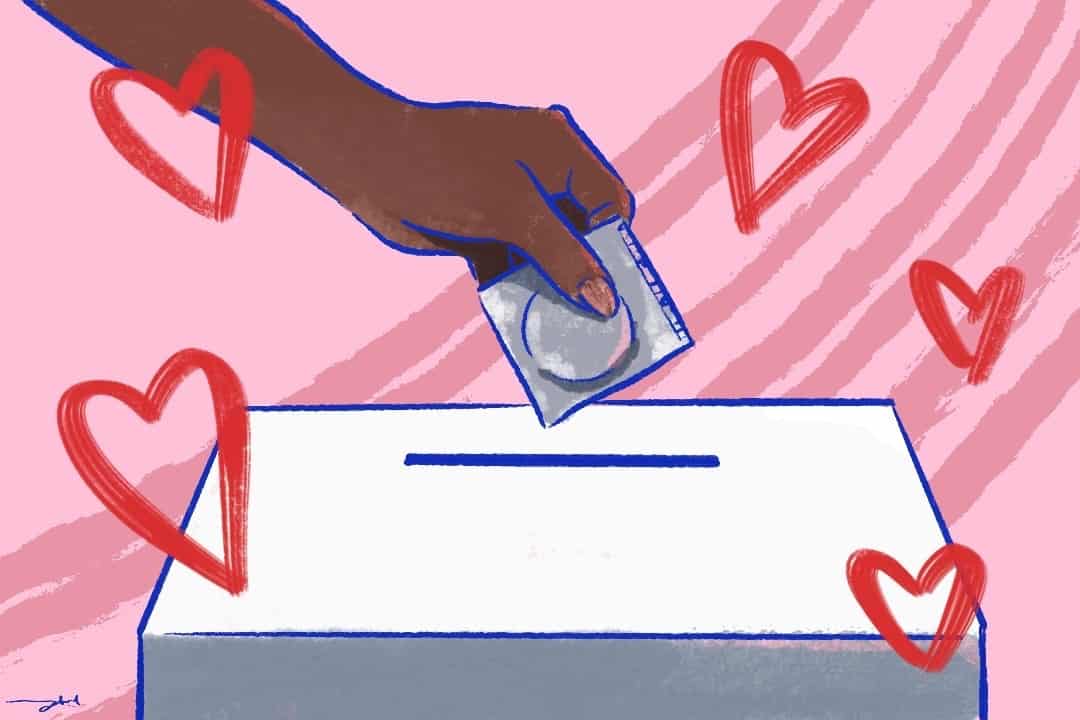When describing a perfect romantic partner, some standards need to be spelled out, and some are just a given. Like many others, I can’t imagine dating someone who holds different values from me. Politics showcase a person’s morals and principles, and our political beliefs reflect who we are and how we view the world. Personally, my dating someone is contingent on an agreement on our shared principles and most political discourses. The alternative is unimaginable: married or with kids, and having to defend my morals and principles regularly from someone who is meant to be my life partner and support person sounds exhausting.
The story is different with casual sex — which, as a rule, is meant to be impersonal. With casual sex, we’re not supposed to care about the person, so we can minimize our emotional attachments. I’d argue that most standards become negotiable when the goal is to spend a short time being intimate with someone; I may not care about their fashion sense, drinking habits, or relationship with their parents if the goal is to enjoy their company without knowing them very well. While a long-term connection in a relationship reflects your standards for people you choose to associate with, your short-term partners are less likely to do so.
Yet, I still experience a mental block that prevents me from wanting to spend time with someone whose views clash very much with mine, even if our views aren’t relevant in the bedroom.
Or are they? Do our political beliefs influence who we desire?
It seems like they can. For one, it’s easy to believe that people with different political ideologies have a fundamental stance against us and may resent us for our differing opinions. Many political issues can be rooted in issues of gender, race, and class, which could mean that our political beliefs are not just political but directly involve our identities — who we are. You may not want to sexually engage with someone who you believe discriminates against you.
Interestingly, however, some people don’t mind — and even enjoy the thrill of sleeping with a political opposite. According to a Washington Post report, political humiliation is an alive and thriving scene in taboo fetish communities, where people enjoy degradation, humiliation, and submission from those of opposing political stances. It is common and sexually arousing for some to roleplay as political figures, be degraded based on their race, or be ‘red-pilled’ through domination. That said, fetish communities tend to be outliers and not the norm in society.
Another way to view someone’s disinterest in sexually engaging with our political opposites is to look at the correlation between sexual habits and political stances. In popular culture, it is often perpetuated that left-wing individuals are more sexually active, while right-wing individuals are more “vanilla” or celibate. While this does not apply to everybody, a 2017 study in the journal Personality and Individual Differences found that right-leaning individuals tend to have more traditional sexual habits, such as engaging in missionary sex, while left-leaning individuals tend to be more adventurous and open to things such as sex toys or masturbation. Their research explores various sexual habits in relation to politics.
The study also references Hans Eysenck’s 1976 book Sex and Personality, in which he finds that anti-government views positively correlate with aggressive sexual behaviours, that left-leaning individuals tend to have a higher number of unsatisfying sexual experiments, and that right-leaning views tend to translate into less sexual shyness. This may be another reason why we subconsciously view political opposition as a turn-off: deep inside, we know they may not share sexual interests and expectations.
These findings appear theoretically similar to a phenomenon called positive assortative mating, which occurs when people would rather romantically and sexually engage with those who are physically similar to them. Similar principles also work for social attraction: we judge others much more harshly on differences than we do on similarities. In other words, we tend to notice and write off those who are unlike us more quickly than we would give someone similar to us a chance. Being turned off by a potential sexual partner’s different politics may be based on our natural propensity to seek similarities and harshly judge what is different.
So why might we be interested in the political views of our hookups, even if our personal connection with them is not our primary focus? Essentially, it might be because we tend to subconsciously group and label people based on our perception of their similarities and differences to us. Although we may not all consciously care about the politics of those we sleep with, on some level, we know that sexual compatibility may be likelier with those on our side of the political spectrum. After all, a successful one-night stand is one where both parties feel satisfied.



No comments to display.